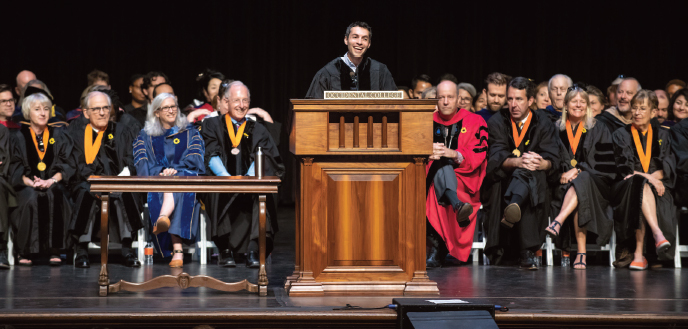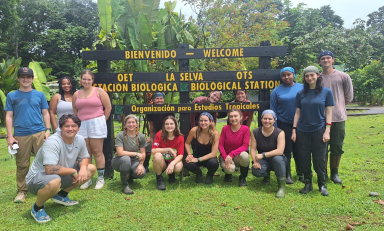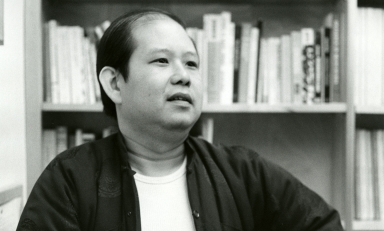
What does the future of Occidental’s curriculum look like? Inclusive, interdisciplinary, urban, and global, according to a task force of Oxy faculty
Interdisciplinary. Rooted in research. Committed to both disciplinary mastery and inclusion. Imbued with urban and global perspectives. And taught primarily by full-time tenure-track faculty.
That’s the future of Occidental’s curriculum, according to a new report from the College’s academic planning task force that draws on a year’s worth of biweekly meetings, faculty surveys, and campus consultations. “The curricular review is not about making decisions about what will be taught in each department, or necessarily about the creation of new programs,” says Wendy Sternberg, vice president for academic affairs and dean of the College, who served on the 13-member faculty committee. “Rather, it is providing important questions for our faculty to consider and framing a coherent process to help us reach our goals.”
Presentation of the task force report at the annual faculty retreat in August left faculty “committed to all of the major goals and excited about all the possibilities for interdisciplinary collaboration,” says Gretchen North, Faculty Council president and task force member. It also marks the beginning of a new conversation among faculty and administrators as they wrestle with the challenges of how to support interdisciplinary programs in an academic structure based on departments; how to choose among multiple options that will influence new faculty hires; how to find space for new faculty and new or expanded programs; and, finally, how to pay for it all.
The task force first convened in October 2017 in response to the convergence of a number of developments on campus. “This is Oxy’s Strategic Plan 2.0, partly arising from our evaluation of what we accomplished with the 2012 strategic plan, what remains to be accomplished, and what new initiatives we should explore,” says North, Oxy’s John W. McMenamin Endowed Chair in Biology.
For example, North cites the 2012 strategic plan’s goal to emphasize Oxy’s commitment to global perspectives. “There is widespread agreement that we have done a good job and achieved much of what we set out to achieve,” she adds, pointing to the College’s Kahane United Nations program, the McKinnon Center for Global Affairs, the Young Initiative on the Global Political Economy, and the expansion of study and research opportunities abroad.
At the same time, as much as a third of Oxy’s faculty is expected to retire over the next decade, setting the stage for a wave of new hires, each of which has potential implications for the curriculum. “A plan is essential to frame the impending turnover of a sizable fraction of the faculty,” the report says.
Sternberg brought her own perspective to campus as Oxy’s new academic dean in July 2017, one with a self-identified propensity to enhance the role of research in the curriculum. “Training students to think like scholars helps achieve the critical thinking skills of a liberal arts education,” she says.
Expanding research opportunities across the curriculum is one reason the task force calls for a 10-year plan to significantly increase the number of tenure-track faculty. (Currently, 71 percent of full-time faculty are tenured or tenure-track.) Oxy professors have an obligation to engage in outside-the-classroom interactions with students, the task force noted. Non-tenure track faculty “cannot be expected to mentor comprehensive projects, summer research, provide career and graduate school mentoring in that area of specialization, and may not be at Oxy throughout the course of a student’s undergraduate career,” the report states.
While interdisciplinary programs have been part of the curriculum dating back to the launch of biochemistry in 1974, the task force suggested there might be additional opportunities for cross-disciplinary collaboration. This could take the form of new interdisciplinary programs (such as food studies, crime and punishment, and Native American/indigenous studies), new connections among existing programs, or policy changes to encourage collaboration among faculty from different fields. Academic disciplines themselves are likely to change focus in response to shifts in faculty—one possible example would be physics becoming a department of physics and astronomy. (Oxy’s Core Studies Program is the subject of a separate review, with recommendations due next spring.)
When all is said and done, the fundamental question is this: “What do we want an Oxy grad to have under their belt when they graduate?” North says. “We want them to value the liberal arts, have command of a discipline and a deep understanding of what other disciplines do and how they work together. We want all of our graduates to have research experience, and to be involved in community-engaged learning. And we definitely want them to be committed to equity and a just society.”



